Explained: This is what Kerala has done to receive its expatriates
From Thursday night, Kerala began receiving expatriates stranded abroad due to the coronavirus pandemic. How many people are expected to return? What measures has the state taken?
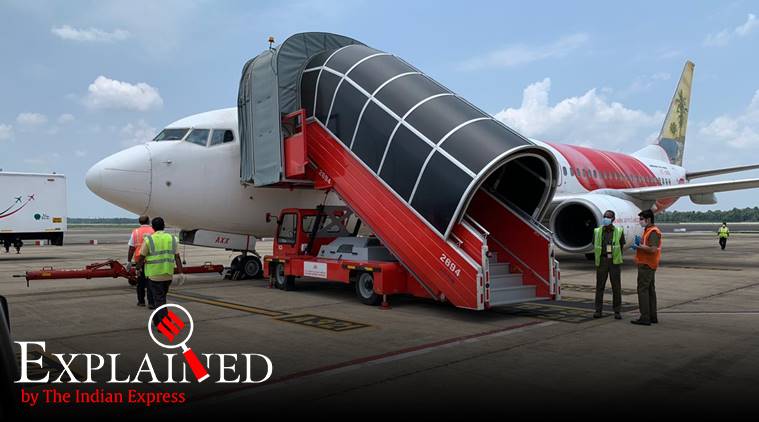 Air India Express Flight No IX 419 readies for departure at Calicut International Airport, on Thursday, May 7, 2020.
Air India Express Flight No IX 419 readies for departure at Calicut International Airport, on Thursday, May 7, 2020.
Starting Thursday night (May 7), Kerala’s four international airports began to receive the first batch of expatriates stranded abroad as part of the Centre’s Vande Bharat evacuation efforts, billed as the most extensive rescue programme the country has engaged in since the Kuwait war.
How many people are expected to return home to Kerala?
Over four lakh people, who are residents of the state, have registered themselves on the government website NORKA-ROOTS indicating their willingness to come home due to a variety of reasons. A majority of them are from the GCC countries. Expatriates have also registered their names on a parallel scale with the local embassies. However, it is unclear whether all these people would be allowed to travel home, considering certain conditions and priorities set by the local embassies and the Centre. Those on the priority list include pregnant women, elderly people and others requiring urgent medical treatment, students, those who left on visiting visas and have overshot their welcome and those who lost their jobs and don’t have a place to stay. According to reports, around 1.69 lakh people belong to the priority categories.
Follow live updates on the evacuation in Malayalam
As part of phase one of the evacuation efforts, 15 of the scheduled 64 flights from different countries between May 7 and May 13 are destined for Kerala, each carrying nearly 200 passengers. Flights operating to Kerala will carry people from Dubai, Abu Dhabi, Riyadh, Doha, Bahrain, Kuwait, Muscat, Kuala Lumpur and Dammam.
Two flights will arrive tonight, one from Abu Dhabi to Kochi at 9.40 pm and the other from Dubai to Kozhikode at 10.45 pm.
Which airlines are operating the rescue flights? Are the tickets free?
Air India and Air India Express will be operating the flights, rescuing stranded people from other countries. The tickets are not free and will not be borne by the Indian government. Those returning on the flights will have to shell out money for the trip back home.
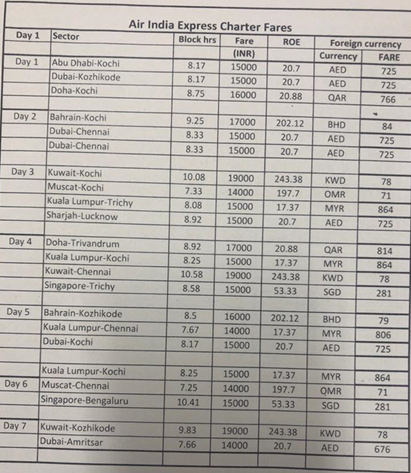 Air India Express Charter Fares, as released by the Centre.
Air India Express Charter Fares, as released by the Centre.
Will the expatriates be medically screened before they board flights for India?
Yes, there will be a basic medical screening for those wishing to return home. Only those found asymptomatic will be allowed to board the aircraft.
However, the Centre did not accede to Kerala’s request to test the expatriates for Covid using PCR test before they board the flight. The state had expressed its concerns that even one or two persons who could be infected but asymptomatic could spread it to others in the aircraft.
📢 Express Explained is now on Telegram. Click here to join our channel (@ieexplained) and stay updated with the latest
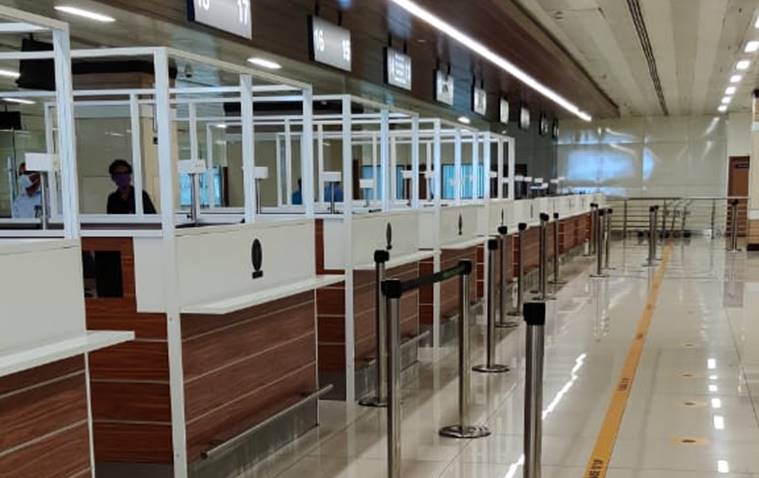 At the Cochin International Airport on Thursday. One flight will land at the airport tonight from Abu Dhabi at 9.40 pm. (Express Photo Vishnu Varma)
At the Cochin International Airport on Thursday. One flight will land at the airport tonight from Abu Dhabi at 9.40 pm. (Express Photo Vishnu Varma)
What protocols has Kerala put in place at its four international airport terminals to screen the returnees?
For weeks, the state health department has been engaged in setting up facilities and protocols that will be pushed into action when the expatriates come home. On Wednesday, health minister KK Shailaja said in a statement that her department is fully equipped to deal with the challenge of welcoming the expatriates at all four international airports – Thiruvananthapuram, Kochi, Kozhikode and Kannur.
Separate mobile health applications have been created to register and track the expatriates who will arrive at three of the airports in the first phase – Kochi, Thiruvananthapuram and Kozhikode. The app to be used at Thiruvananthapuram is named ‘Karuthal’ (precaution in Malayalam), the one designed for Kochi is Ayurraksha and the one for Kozhikode is Agamanam (arrival in Malayalam). All the details of those who have registered on the NORKA website have been plugged into the app. Using QR codes, each of the travellers can be contacted and traced.
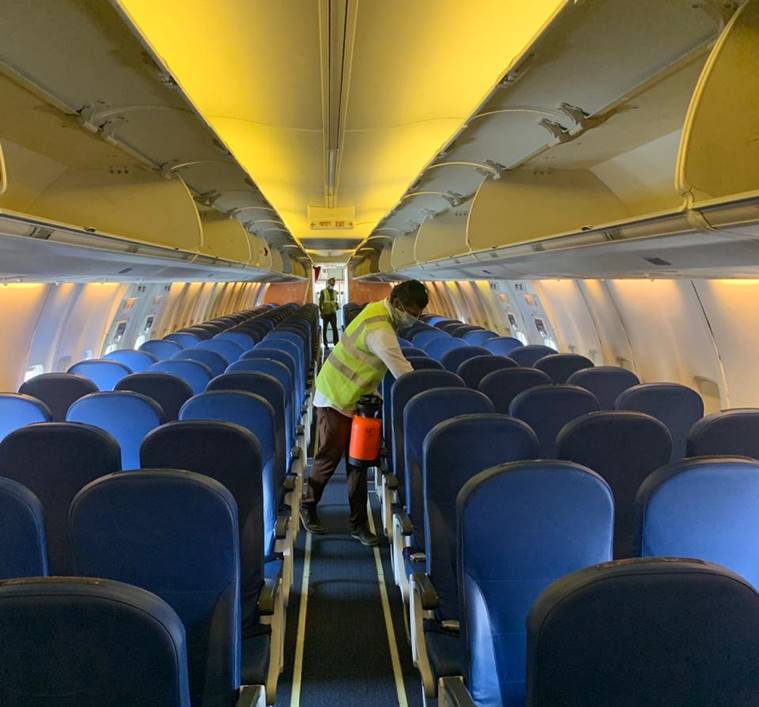 The Air India Express flight is santised before take off from Calicut International Airport.
The Air India Express flight is santised before take off from Calicut International Airport.
The Centre has also asked travellers to download the Aarogya Setu mobile application and follow all the government-issued health guidelines.
Passengers inside flights will be seated in a zig-zag fashion, wearing masks. 45 minutes before arrival, announcements will be made inside the flight about quarantine procedures. Travellers will have to fill in self-report forms and submit at the help desk. 15 to 20 people will be deboarded at a time, with one-metre distance between them. At the aerobridge, their temperatures will be checked. Those running a fever will be sent to the isolation bay. If they don’t have a fever, they will be directed to the help desks. Each of the help desks will be manned by a doctor, staff nurse, volunteer and a data entry operator. Passengers are checked for fever or other symptoms at the help desk by the doctor. If they do, they are directed to the isolation bay.
Those found asymptomatic will be brought to the guiding stations and after their baggage is disinfected, they will be taken to the quarantine facilities set up by the government. Those found with symptoms are taken directly to the nearest hospitals where they will undergo a RT-PCR test for Covid.
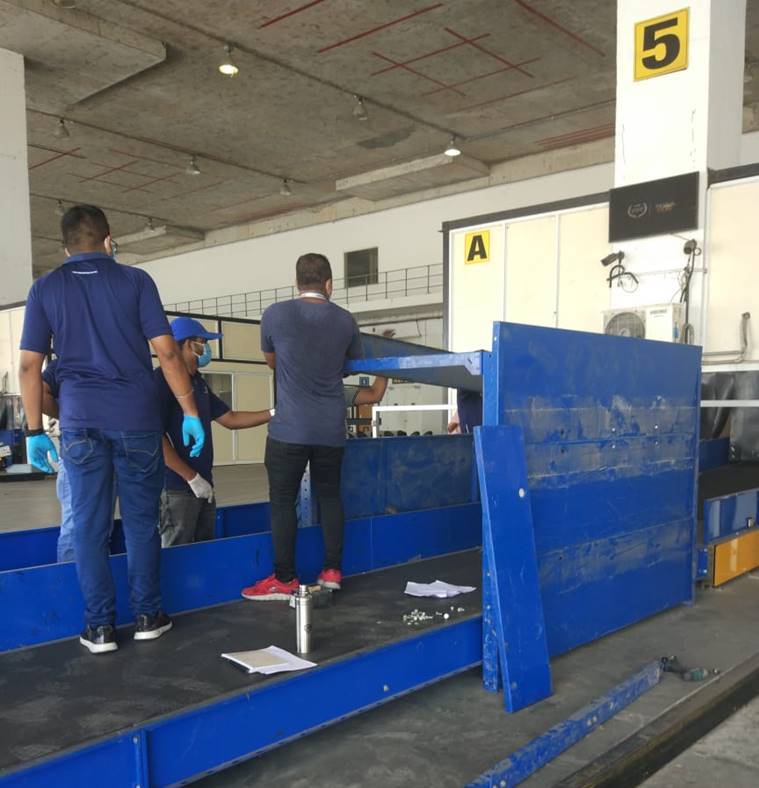 Airport staff in Kozhikode prepare to receive Indians from abroad.
Airport staff in Kozhikode prepare to receive Indians from abroad.
At the Kochi airport, special ultraviolet disinfection machines developed by a DRDO lab will be used to sanitize the baggage of the travellers. Staff at the airport engaged in cleaning duties have been given personal protective equipment (PPE) kits and advised to maintain social distancing while working.
Is Kerala subjecting all returnees to institutional quarantine?
With the exception of pregnant women, everyone will be under institutional quarantine. Unlike in mid-March, when all those who returned to Kerala before the lockdown were allowed to opt for home quarantine, the state is taking extra precautions this time, having learnt its lessons. A number of those who had come abroad in March were reported breaking quarantine and travelling locally and visiting friends. This time, the state is leaving nothing to chance.
Elaborate quarantine facilities have been set up across all 14 districts in colleges, schools, hostels, hotels, resorts, ayurveda retreat centres, stadiums, auditoriums where they can be kept in isolation. For each of the facilities, a doctor will be posted. Food will be brought in from community kitchens. Ambulances have been designated. Those who can afford to pay can rent rooms in hotels as well.
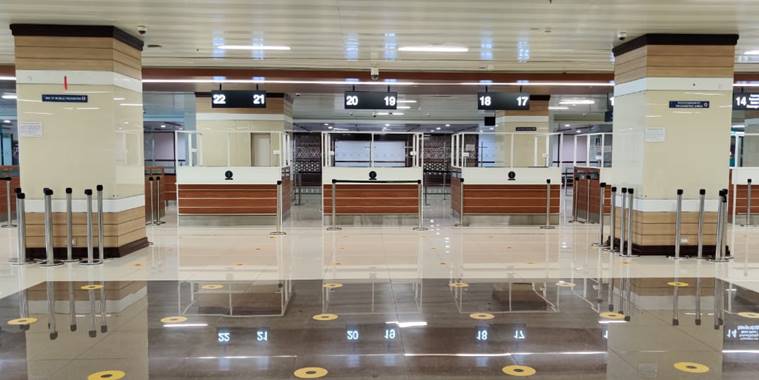 At the Kochi airport on Thursday. 15 to 20 people will be deboarded from the flight at a time, with one-metre distance between them. At the aerobridge, their temperatures will be checked. (Express Photo: Vishnu Varma)
At the Kochi airport on Thursday. 15 to 20 people will be deboarded from the flight at a time, with one-metre distance between them. At the aerobridge, their temperatures will be checked. (Express Photo: Vishnu Varma)
Kerala has decided that all those found asymptomatic at the airport will have to spend the next seven days at quarantine facilities arranged by the government. After the seven-day period, they will be tested for Covid. If found negative, they will be allowed to return home where they will have to spend the next seven days in quarantine. This arrangement, however, goes against the guidelines of the Ministry of Home Affairs which mandates 14 days of institutional quarantine considering the 14-day incubation period of novel coronavirus. Since health is a state subject, Kerala has taken a position that it can decide on related matters.
Is Kerala ramping up Covid-specific medical facilities given the return of expatriates?
Yes. In a release, the health department said it has drawn up three plans A, B and C with private hospitals brought in if required in plan C depending on the number of patients. Plans A and B involve only government hospitals. A total of 207 government hospitals including 27 Covid-specific institutions are part of the A and B plans. The department has at its disposal 11,084 isolation beds which can be stretched to 18000 beds at its peak. Additionally, 1679 ICU beds are also available.
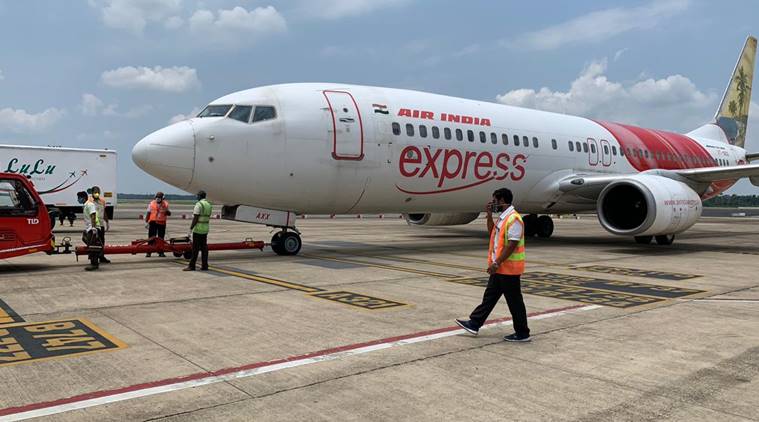 Air India Express flight IX 343 from Kozhikode to Dubai took off at 1.40 pm.
Air India Express flight IX 343 from Kozhikode to Dubai took off at 1.40 pm.
How many Covid patients are currently under treatment in the state?
There are 30 persons currently under treatment after being detected with the coronavirus. A total of 502 persons have been infected so far in the state since January 30.





- 01
- 02
- 03
- 04
- 05

































